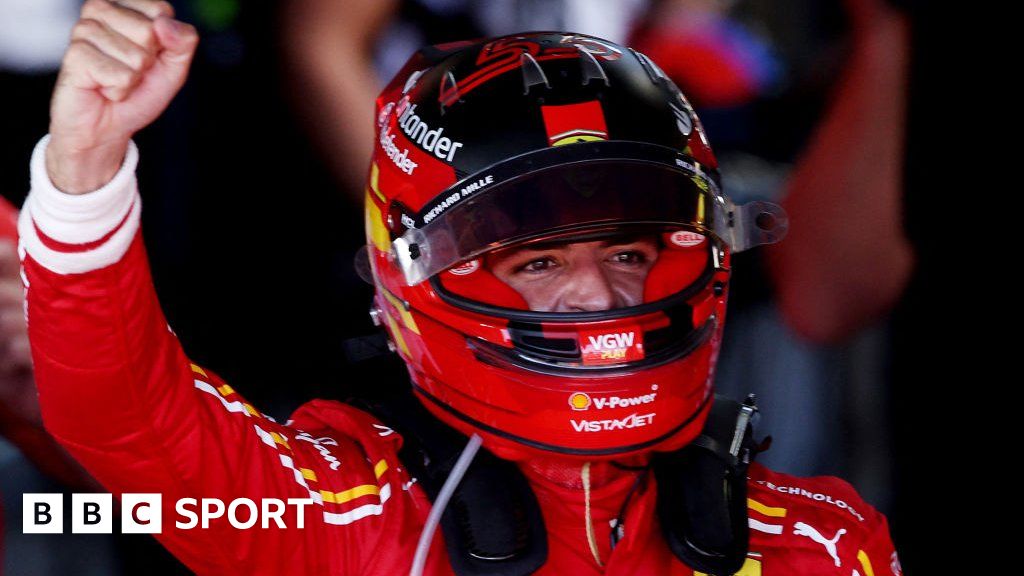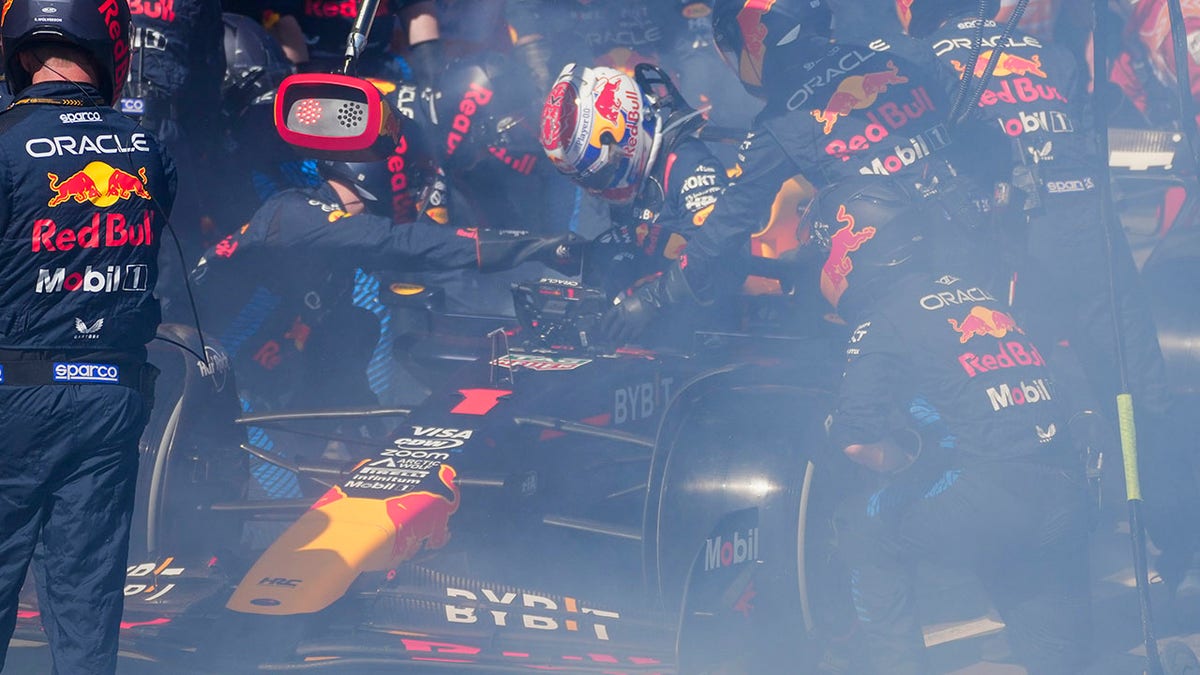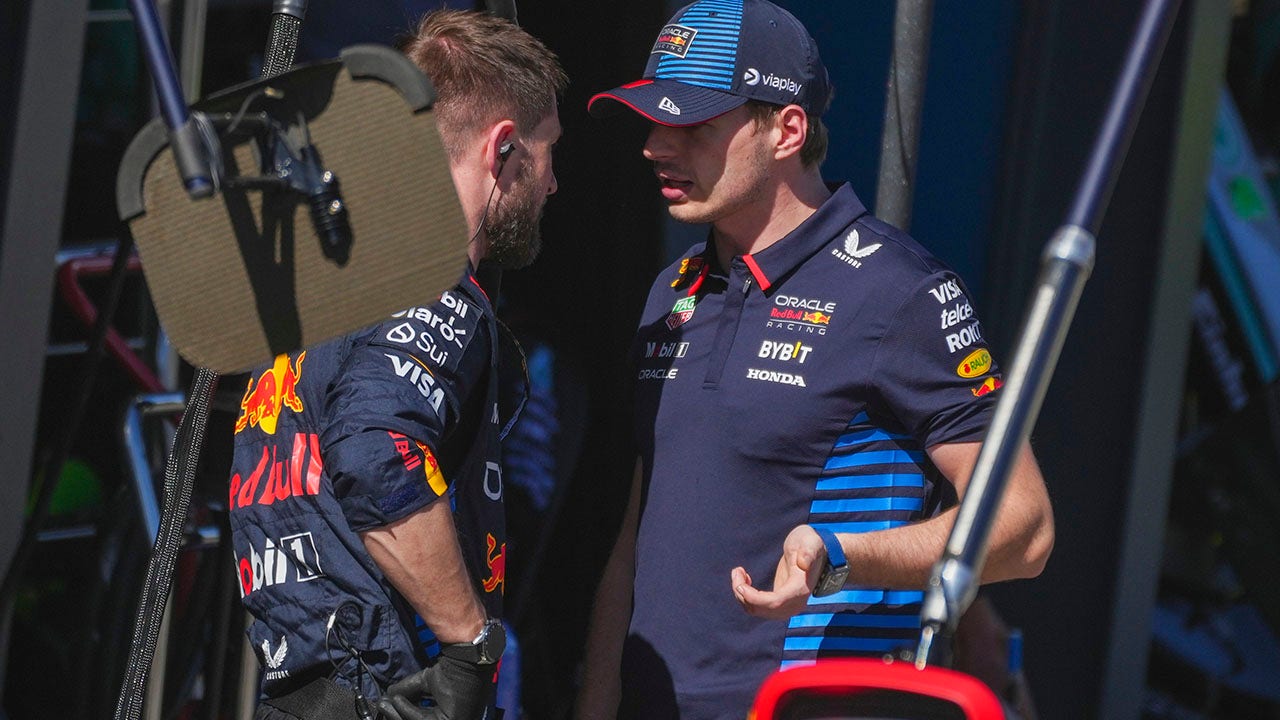Formula 1 is a popular sport that attracts millions of fans worldwide. The Australian Grand Prix, held in Melbourne, was the third race of the season and saw some exciting moments for Formula One drivers. Max Verstappen had been leading the championship since winning the first two races but suffered a brake failure on lap three and retired from the race with his right-rear brake on fire. Carlos Sainz won his second consecutive Grand Prix, passing Verstappen on lap one and controlling the race throughout. Ferrari finished 1-2 in the Australian Grand Prix as Charles Leclerc came in second place behind Sainz.
Australian Grand Prix: Carlos Sainz Wins Second Consecutive Race, Max Verstappen Retires Early
Melbourne, Victoria, Australia AustraliaFormula 1 is a popular sport that attracts millions of fans worldwide.
The Australian Grand Prix, held in Melbourne, was the third race of the season and saw some exciting moments for Formula One drivers.





Confidence
100%
No Doubts Found At Time Of Publication
Sources
52%
F1 star Max Verstappen's car spews black smoke, catches fire in bad day at Australian Grand Prix
Fox News Media Ryan Gaydos Sunday, 24 March 2024 22:12Unique Points
None Found At Time Of Publication
Accuracy
- Max Verstappen had a tough outing at the Australian Grand Prix on Sunday in the third Formula One race of the 2024 season.
- Verstappen's Red Bull Racing vehicle started to smoke.
- Red Bull driver Max Verstappen was forced to retire from the race as he came into the pits, his car exploded and spewed black smoke briefly.
Deception (50%)
The article is deceptive because it uses emotional manipulation and sensationalism to make the reader feel sympathy for Verstappen and anger towards his car. The title of the article uses words like 'spews', 'catches fire' and 'bad day' to create a negative impression of what happened. The author also implies that this was an unexpected event by saying that Verstappen had won 19 races last season on his way to his third consecutive world championship, suggesting that he is invincible and unbeatable. The article does not provide any context or explanation for why the car malfunctioned or what caused it to catch fire. It also does not mention any other factors that could have contributed to Verstappen's retirement, such as weather conditions, track conditions, tire wear, etc. By focusing only on the dramatic and negative aspects of the incident, the article is trying to elicit an emotional response from the reader without giving them a balanced or accurate picture of what happened.- The author uses emotional manipulation by saying that Verstappen had won 19 races last season on his way to his third consecutive world championship, suggesting that he is invincible and unbeatable. This implies that this was an unexpected event and makes the reader feel sympathy for Verstappen.
- The article does not provide any context or explanation for why the car malfunctioned or what caused it to catch fire. It also does not mention any other factors that could have contributed to Verstappen's retirement, such as weather conditions, track conditions, tire wear, etc.
Fallacies (70%)
None Found At Time Of Publication
Bias (85%)
The article contains examples of religious bias and monetary bias. The author uses language that depicts one side as extreme or unreasonable by saying 'Max Verstappen had a tough outing at the Australian Grand Prix on Sunday in the third Formula One race of the 2024 season.' This implies that Max Verstappen is not capable of performing well and this could be seen as an attack on his character. The author also uses language that depicts one side as extreme or unreasonable by saying 'Verstappen began to lose power and was forced to retire from the race in one of the shocking events of the season.' This implies that Max Verstappen is not capable of performing well and this could be seen as an attack on his character. The author also uses language that depicts one side as extreme or unreasonable by saying 'Verstappen won 19 races last season on his way to his third consecutive world championship.' This implies that Max Verstappen is not capable of performing well and this could be seen as an attack on his character.- Max Verstappen had a tough outing at the Australian Grand Prix
- Verstappen began to lose power and was forced to retire from the race in one of the shocking events of the season
- Verstappen won 19 races last season on his way to his third consecutive world championship.
Site Conflicts Of Interest (0%)
None Found At Time Of Publication
Author Conflicts Of Interest (0%)
None Found At Time Of Publication
80%
F1 five quick hits — Oscar Piastri plays the team game for Norris, Verstappen drives with a 'handbrake'
ABC NewsRadio Michael Doyle Sunday, 24 March 2024 07:25Unique Points
- Oscar Piastri finished fourth in the Australian Grand Prix
- Max Verstappen had a brake issue from the start of Sunday's race and retired with his right-rear brake on fire
- Carlos Sainz finished third in Melbourne but was looking for a new team next season as Ferrari extended Charles Leclerc's contract and signed Lewis Hamilton for 2025.
- Lando Norris achieved an F1 record with his third place finish, the most podiums by a driver without having a race win overtaking retired German driver Nick Heidfeld.
Accuracy
- Max Verstappen had a tough outing at the Australian Grand Prix on Sunday in the third Formula One race of the 2024 season.
- Verstappen's Red Bull Racing vehicle started to smoke.
- Red Bull driver Max Verstappen, right, talks with a teammate after retiring from the Australian Formula One Grand Prix at Albert Park in Melbourne on Sunday March 24th 2024.
Deception (100%)
None Found At Time Of Publication
Fallacies (85%)
The article contains several fallacies. The author uses an appeal to authority by stating that McLaren achieved third and fourth place in the race without making any new Australian fans with team orders. This is not true as it implies that team orders are inherently negative for a driver's popularity, which is not necessarily the case. Additionally, the author uses inflammatory rhetoric when describing Max Verstappen driving with a handbrake on and his retirement from the race due to mechanical failure. The use of such language creates an emotional response in readers rather than providing objective information about the situation.- McLaren achieved third and fourth place, but would not have made any new Australian fans with team orders.
Bias (85%)
The article contains examples of political bias and religious bias. The author uses language that dehumanizes one side as extreme or unreasonable.- > Oscar Piastri drove a solid race in his hometown to finish fourth, the best finish by an Australian at Albert Park.
Site Conflicts Of Interest (50%)
None Found At Time Of Publication
Author Conflicts Of Interest (50%)
None Found At Time Of Publication
73%
Formula 1: Carlos Sainz wins Australian Grand Prix as Max Verstappen fails to finish
Yahoo Sports Nick Bromberg Sunday, 24 March 2024 22:15Unique Points
- Max Verstappen's quest for a 10th straight Formula 1 win ended on the third lap of the Australian Grand Prix.
- Carlos Sainz won the race and passed Max Verstappen on the first lap. He went unchallenged throughout.
Accuracy
- Carlos Sainz won the race, passing Max Verstappen on the first lap and going unchallenged throughout.
Deception (50%)
The article is deceptive in several ways. Firstly, the title claims that Max Verstappen failed to finish the race when he actually retired on lap 3 due to a technical issue with his car. Secondly, it states that Sainz won 'in some extraordinary circumstances' without providing any context or explanation for these circumstances. Thirdly, it mentions Hamilton's retirement and penalty but does not provide any details about why they occurred or how they affected the race outcome.- The article mentions Hamilton's retirement and penalty but does not provide any details about why they occurred or how they affected the race outcome. This is an example of selective reporting as it only reports on events that support the author's position without providing a complete picture of what happened.
- The title claims that Max Verstappen failed to finish the race when he actually retired on lap 3 due to a technical issue with his car. This is an example of deceptive phrasing as it implies that Verstappen did not complete the entire race, which was not true.
- It states that Sainz won 'in some extraordinary circumstances' without providing any context or explanation for these circumstances. This is an example of deceptive language as it creates a sense of mystery and intrigue without actually giving any information about what made Sainz's victory extraordinary.
Fallacies (85%)
None Found At Time Of Publication
Bias (100%)
None Found At Time Of Publication
Site Conflicts Of Interest (50%)
None Found At Time Of Publication
Author Conflicts Of Interest (50%)
None Found At Time Of Publication
70%
Formula 1: Carlos Sainz wins Australian Grand Prix after Max Verstappen retires
BBC News Site: https://www.bbc.com/news/world-us-canada-68702081, About Us URL: https://www.bbc.com/aboutthebbc/ Andrew Benson Sunday, 24 March 2024 22:16Unique Points
- Carlos Sainz won the Australian Grand Prix
- Max Verstappen retired after just four laps due to a brake failure
- Ferrari finished first and second in the race
- τ Charles Leclerc finished in second and McLaren's Lando Norris took home third.
- ⚡ Lewis Hamilton also had engine trouble, which saw him finish in 18th. Hamilton's teammate George Russell crashed and nearly turned his vehicle over on the last lap trying to get around Fernando Alonso.
Accuracy
- George Russell crashed on the final lap of the race, suffering no injuries but being called to the stewards for driving potentially dangerous behavior
- Lewis Hamilton retired after 16 laps with an engine failure
Deception (50%)
The article is deceptive in several ways. Firstly, it states that Max Verstappen's domination of Formula One stalled after he retired from the race on lap four due to a brake failure. However, this statement is misleading as Verstappen was leading at the time of his retirement and had not been dominating the race prior to his departure. Secondly, it states that George Russell crashed while chasing Fernando Alonso for sixth place in an attempt to overtake him on Turn Six on the final lap. However, this statement is also misleading as Russell did not crash due to a mistake by Alonso but rather because he lost control of his car after accelerating too early and then braking. Finally, it states that Lewis Hamilton retired from the race after 16 laps with an engine failure. However, this statement is false as Hamilton finished the race in second place.- The article claims that Lewis Hamilton retired from the race after 16 laps with an engine failure. This claim is false as Hamilton finished the race in second place.
- The article claims Max Verstappen's domination of Formula One stalled after he retired on lap four due to a brake failure. This claim is misleading because Verstappen was leading at the time of his retirement and had not been dominating the race prior to his departure.
- The article states that George Russell crashed while chasing Fernando Alonso for sixth place in an attempt to overtake him on Turn Six on the final lap. However, this statement is also misleading as Russell did not crash due to a mistake by Alonso but rather because he lost control of his car after accelerating too early and then braking.
Fallacies (85%)
The article contains several logical fallacies. The author uses an appeal to authority by stating that Max Verstappen's domination of Formula One stalled without providing any evidence or context for this claim. Additionally, the author makes a false dilemma by suggesting that there are only two options: either Sainz won because he was faster than Verstappen or because Verstappen retired. The article also contains an example of inflammatory rhetoric when describing George Russell's crash as- ]The Spaniard then controlled the race as Leclerc passed McLaren’s Lando Norris in the first pit-stop period.
Bias (85%)
The article is biased towards the success of Carlos Sainz and his victory in the Australian Grand Prix. The author uses language that dehumanizes Max Verstappen by referring to him as a 'world champion's Red Bull', which implies that he is not deserving of respect or admiration. Additionally, the article portrays Ferrari as being superior to other teams and drivers, despite their recent struggles in Formula 1. The author also uses language that demonizes Mercedes for their poor performance in the race.- Ferrari is a team of champions
- Mercedes are struggling
- The world champion's Red Bull
Site Conflicts Of Interest (50%)
None Found At Time Of Publication
Author Conflicts Of Interest (50%)
The author has a conflict of interest on the topic of Formula 1 as they are reporting for BBC Sport which is an official broadcaster and sponsor of the sport. The article also mentions Max Verstappen who is one of Ferrari's top drivers and Ferrari was involved in a controversy with another team at the Australian Grand Prix.- The article mentions Max Verstappen who is one of Ferrari's top drivers and Ferrari was involved in a controversy with another team at the Australian Grand Prix.
- The author reports on Formula 1 for BBC Sport which is an official broadcaster and sponsor of the sport.